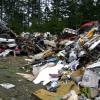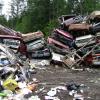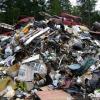What to do with expired vehicles?
The shipyard has now "closed it's gates" and will not be accepting any more vehicles - this raises a crucial question for our community - what will we do with the old junkers that all of our vehicles will eventually become?
If we leave this question for too long, the problem will be big, dispersed, and hard to handle - as we'll likely end up with lots of little piles that look like these ones all over the island.
If we tackle it now and try to be a bit proactive, maybe we can come up with a long-term solution that avoids this otherwise inevitable outcome.
Get out your thinking caps - this one is going to require a solution that everyone (or at least most people) can get behind...





Comments
car dump
what I wonder, is why would there be so much garbage in a car dump? In the pictures, I can see plastics, drywall and assorted other building materials. We clearly have a long way to go before we are masters of our junk.
exactly Na!
.. a private business doing us a good service, and we dumped trash on them...
... free store would look the same if Jenny, Robin, et al weren't dealing with the trash dumped on them too!
But trash seems the easier (though larger) problem - the vehicles worry me because people will likely have to pay to get rid of them - pay-to-dispose is a great system if you're shooting for dump-it-in-the-woods. A disincentive even for those of us who choose not to dump our trash on others.
Now a deposit system.... that sounds more promising... :-)
What to do with vehicles we no longer want
One easy way to dispose responsibly of vehicles we no longer want, especially when we're having another one barged over, is to ask the barge operator to take your old one over. Most of the wreckers will come and pick up a wreck from French Creek without charge, and they will bring a trailer and drag it off the barge (or they did a few years ago).
If you're not bringing another vehicle over, pair up with someone who is, or ask the barge operator to take yours over. Barges usually have room on the trip over to Vancouver Island, so it shouldn't cost much.
If there are other things you don't know how or where to recycle, or dispose of, call the Recycling Council of BC Recycling HOTLINE: 1-800-667-4321 (604-RECYCLE (732-9253) in Lower Mainland) or e-mail them at hotline [at] rcbc [dot] bc [dot] ca
My favourite place is the Nanaimo Recycling Exchange, 2477 Kenworth Road in Nanaimo. There's a list of what they take (most everything!) and what they charge (usually nothing at all) at http://recycling.bc.ca/what-we-take/ or you can call them at 250-758-7777; Fax 250-758-7789; or email them at info [at] recycling [dot] bc [dot] ca They are open 7am to 7pm, 7 days a week. It's an interesting organization.
It helps everyone when we take our own stuff over for recycling (or disposal). After all, that's where it came from, and that's where it is most likely and easily taken care of - recycled or disposed of and looked after safely. Some of us don't have regular access to vehicles on Vancouver Island, so it will help if, especially when we have small amounts to take, we offer to take stuff for our neighbours, too.
Add a deposit to imports
One thing we could do is add a $200 import duty on all cars brought here. That way there would be funds to remove them once they are finished.
Market-based solutions...
A deposit makes sense. I wonder about combining the idea with market-based solutions used for pollution-control. For example, the $200 deposit gives you a coupon to barge one car off Lasqueti. This could then be kept for your own use or sold (or gifted) to someone who needs to get a car off. Would be particularly effective if the deposit / coupon cost was less than the "regular" cost of barging a car off - this gives the coupon added value (i.e., incentive). This could be achieved with a subsidy on the deposit coupons (or via a "tax" on the "regular" fee, which has the pay-to-dispose problems noted above). This subsidy might come from the barge operators, who would see additional revenue from this scheme, or perhaps from a public pool (grant, PRRD, or Islands Trust).
Post new comment